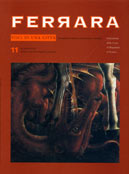Who was Ugo Bassi? We can get an idea from Giuseppe Garibaldi's description of him: "Ugo Bassi, who in battle practised the ministry of the priesthood with the generous mercy that is equal to God, possessed at once the naiveté of a child, the faith of a martyr, the knowledge of a man of letters, and the courage of a hero." The young Ugo Bassi first showed his patriotic ardour in 1815, when he joined Murat's army as a volunteer.
But the time was not yet ripe. Six years later, he took monastic vows with the Order of the Barnabites and was ordered to go out and preach the word. He held his first sermon at Vercelli in 1828, and for twenty years he fascinated the crowds that flocked to listen to him, in all the cathedrals of Italy. His life as a preacher was not easy. In 1835, on 2 May, Pope Gregory XVI invited him to Rome and had a long talk with him, during which he counselled him to be more prudent and less impassioned and exuberant in his preaching.
Four years later, the Secretary of State, cardinal Lambruschini, accused Bassi of affiliation with the masonry and in 1840, in the course of a cycle of sermons in Piacenza, he was relieved of his post and forbidden to preach in the Papal States.
He was enormously enthusiastic about the election of Pius IX, and took part in the popular demonstrations of 1846 in favour of this Pope who, at first, openly favoured Italian independence. In 1848, a year of great passions and even greater expectations, Ugo Bassi went to Rome, where Pius - in whom all the hopes of the Italians lay - granted him an audience.
In that same year, Ugo Bassi was frenetically active: he held novenas and Lenten sermons, issued patriotic appeals, and gave fascinating sermons in all the more important cities before enthusiastic, cheering crowds. Nor did he forget his home town, where he spoke from a tribune erected in piazza del Guercino on 30 April 1848, exhorting the people to support the war of independence. His enthusiasm for the Pope who had given his blessing to Italy was such that he proposed to rename Cento Piopoli: "the city OF Pius".
The key episode in the last months of Bassi's life was his meeting with Garibaldi, on the morning of 3 March 1849, on the outskirts of Chieti, where Garibaldi's Legion - called in to help out the Roman Republic - was encamped. Garibaldi had little love for priests and clerics; but despite this he got on well with Bassi from the start. He immediately nominated him chaplain and, when the Legion was on the move, he had him ride at his side, making frequent jokes about Bassi's black Barnabite habit.
This new-born friendship was sealed at Agnano, on 24 April 1849. After a rousing sermon that moved all who heard it, Bassi was carried off in triumph by the Legionnaires. Garibaldi was moved to tears, he embraced Bassi and made him a gift of his finest uniform.
Today streets and squares in very many Italian cities are dedicated to Ugo Bassi, a symbol of the Italian people's gratitude to this hero of the Risorgimento. But Cento has done little for him: a monument, erected after a century of delay, and a book about him written by a doctor from Cento, Didaco Facchini.
The year 2001 marks the two hundredth anniversary of Bassi's birth and we would like to take this opportunity to launch an appeal for a long overdue seminar on his activity as patriol and priest. However, what will never be in any doubt is the heroism with which this apostle of Christ met his death. Having arrived in the Comacchio area, after his escape from Rome, Garibaldi advised Bassi to leave him and seek refuge in a village in the Po delta.
Bassi obeyed, but as ill luck would have it, he sought hospitality in a tavern near Comacchio. Spies reported his presence there to the Austrians, who made him prisoner. Although he was a subject of the Papal State and a priest, he was not handed over to the papal government, which would have allowed him to claim ecclesiastical immunity.
Without benefit of a regular trial, without a sentence, with the sole false accusation of having borne arms - while his only weapon had always been the cross - he was sentenced to death.
At noon on 8 August 1849 he was taken to Villa Spada, where he was shot one hour later, between arches 66 and 67 of the portico that leads from via Saragozza to the basilica of Saint Luca. After the execution, merciful hands retrieved the silver crucifix that he always wore. Today, the crucifix is in the Mayor's Office in Cento.



